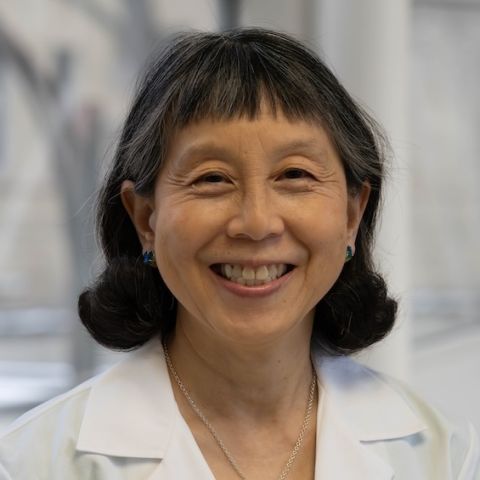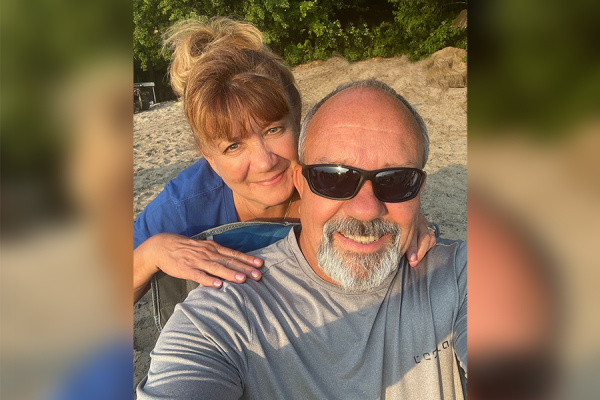Choose a surgeon with the expertise to give you the best treatment and optimal survivorship
If you’ve been diagnosed with lung cancer, one of your first consultations will likely be with a thoracic surgeon to determine whether your cancer can be treated with surgery, and which treatment approaches would be best for you.
Thoracic surgeon Elisabeth Dexter, MD, FACS, of Roswell Park Comprehensive Cancer Center, explains key points you should discuss with the surgeon before deciding where to undergo cancer care.
How would my lung cancer surgery be performed?
“Thoracic surgery is complex. There are vital structures in the chest, including your two lungs, one on the left and one on the right. Each lung is composed of smaller natural portions, called lobes; two in the left lung and three in the right lung, says Dr. Dexter. “Lung cancer surgery could mean one of several types of operations.”
The most common surgeries performed for lung cancer include lobectomy, which removes an entire lobe, and segmentectomy, which removes a smaller portion of lung tissue around the tumor. A less common procedure is pneumonectomy, which removes a whole lung
Segmentectomy removes less lung than lobectomy or pneumonectomy and gives the patient more breathing capacity after surgery than with the other procedures, explains Dr. Dexter. "All of these surgeries involve operating on the airway and blood vessels connected to the heart and the portion of lung to be removed. A wedge resection removes a portion of a lung lobe without dissection of the blood vessels or airway.“
The amount of lung that would need to be removed will depend on several factors, including the location and size of your tumor and how aggressive your cancer type is.
Do you perform minimally invasive surgery for lung cancer?
More than 90% of lung cancer surgeries at Roswell Park are performed with minimally invasive techniques. “Minimally invasive procedures use several very small one-half to 1-inch incisions rather than a long 8-to-10-inch incision and generally result in less post-operative pain and faster healing,” says Dr. Dexter.
Roswell Park has two methods of minimally invasive lung cancer surgery. One, called video-assisted thoracoscopic surgery (VATS) uses a videoscope to look inside little incisions and uses long skinny instruments to operate through small incisions. The other, robot-assisted thoracoscopic surgery (RATS), uses the da Vinci surgical system in which robotic operating tools are placed through the small incisions and are manipulated by a surgeon working at a console.
“All of these resections (pneumonectomy, lobectomy and segmentectomy) can be performed by VATS or robotics. I think that because we have the access to instrumentation like the robot, and special instruments for thoracoscopic surgery, we are able to take on more complex surgeries with little incisions,” she says.
“The robot is beneficial in tighter spaces. For certain surgeries, it may be more beneficial because the robotic instruments and arms can articulate just like a wrist and fingers. Our other minimally invasive thoracoscopic instruments don’t bend. You have to manipulate them from outside the chest, so you don’t have as much flexibility and rotational movement. However, all of the thoracic surgeons at Roswell Park have the expertise to manipulate the instruments to perform complex surgeries with VATS,” Dr. Dexter explains.
“Everybody has a different location and extent of their tumor, which can add complexity. If we’re not able to use minimally invasive procedures, and need to make a bigger incision, it’s usually because the tumor is larger or invades some other structures that we need to do a little bit more reconstruction on,” she continues.
“Because of the high volume of cases that Roswell Park performs, each surgeon understands the special cases when a larger incision is needed to provide the best cancer operation.”
Why Roswell Park for your thoracic surgery?
Our doctos not only follow the evidence-based NCCN treatment guidelines used by physicians around the world; they write them.
How can I be sure this is the right treatment for me?
“Here at Roswell Park, our team of expert physicians and providers from radiology, pathology, medical oncology, radiation and surgery review scans together. We discuss the pros and cons of different tests and treatments and give the patient our best recommendation on how to move forward in complicated cases.”
Because a different amount of the lung needs to be removed in each person depending on the location, size or aggressiveness of the cancer, lung surgeons want to make sure that each individual will recover from surgery with functional status that is acceptable to them. “Some people would never want to be dependent on oxygen while others would prefer that a lung cancer be removed even if they need to be on oxygen,” Dr. Dexter says.
“We explain options of recommended cancer treatments with the patient and help them to decide which is the best option for them. Having a team of oncologists, radiation, interventional pulmonary and radiology doctors that specialize in lung cancer allows Roswell Park to offer proven or cutting-edge treatments depending on each person’s needs and preferences.“
How many of these surgeries have you done?
Experience from performing a high number of these difficult operations matters when choosing a lung cancer surgeon and center. A high-volume center for lung cancer surgery is one that performs at least 20 of these surgeries a year. At Roswell Park, our thoracic surgeons perform 360. Each surgeon at Roswell Park is also a high-volume surgeon. With more than 10 years of experience herself, Dr. Dexter, whose primary clinical focus is malignant and benign diseases of the lung, performs about 130 lung resection procedures a year.
“Higher volume centers are more likely to have seen abnormal anatomy or physiology and be able to address abnormal findings. They also have the necessary, and often more modern equipment and technology and standard processes, for optimal preoperative, intraoperative and postoperative care,” Dr. Dexter says.
Why is it important to be treated at a National Cancer Institute-designated comprehensive cancer center?
The staff at a National Cancer Institute-designated comprehensive cancer center provide the benefits of experience in tried-and-true treatments and being involved in developing and trialing cutting-edge treatments. They are actively involved in committees and studies that keep them informed of new cancer treatments and technology.
Centers like Roswell Park also have a comprehensive medical staff familiar with complex cancers and include other key experts in your care such as medical and radiation oncologists, pulmonologists, respiratory therapists plus others that work together every day.
“When facing lung cancer surgery, choose a surgeon and treatment center with the expertise to give the best treatment and optimal survivorship,” advises Dr. Dexter.
“More than anything I think the reason to come to Roswell Park for lung cancer surgery is that we have a whole program in place,” she says. “It’s not just about the surgery. It’s about the evaluation before the surgery. It’s about the care you receive before, during and after surgery.”



